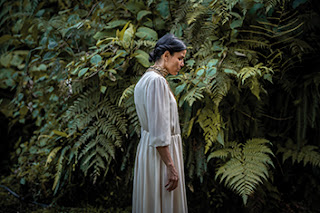By Dimitri Keramitas
Clara believes that everyone has a secret name. But hers is hiding in plain sight and is linked to her excruciating solitude, as depicted in the debut film of Costa Rican-Swedish director Nathalie Álvarez Mesén.
The eponymous protagonist of Mesén's Clara Sola suffers from a twisted back for which her mother refuses an operation, and this disability both aggravates and illustrates her existential condition on a literal level. The irony, however, is that she lives in what seems to be some kind of paradise - an Eden populated almost entirely by a convivial family of women.
Clara (Wendy Chinchila Arraya) claimed at some point
to see a vision of the Virgin Mary, which may well have been a hoax perpetrated
on her religious mother. Nevertheless, the maniacally pious mother (an imposing
Flor María Vargas Chavez) has built a shrine and invites the public to come and
seek Clara’s healing benedictions.
One might think that the cult of the Virgin would lead to female empowerment, but here it is portrayed as life-denying and anti-sexual. This is naturally contradictory, as the mother had to have had a husband to bear not only Clara but another daughter, now deceased. And that daughter herself had a daughter, María (Ana Julia Porras Espinoza).
Arraya does a tremendous job of portraying Clara, fully inhabiting the character. Physically, Clara is very severe-looking (and saddled with that twisted spine), but we feel the vital woman straining to get out. Glimmers of life shine through the apparent emotional and intellectual stuntedness, and we see her chafing at the iron-fisted rule of her mother, while enjoying warm relations with her niece María. Perhaps it’s the sight of María transitioning from pubescence to adolescence and sexuality that sets Clara off. For the fifteenth birthday party, she insists on a blue dress, like that of her niece, rather than the red dress her mother has chosen.
The other factor that catalyses Clara’s attempted metamorphosis (and catalyses the movie as well) is the arrival of a male hand, Santiago (Daniel Castañeda Rincón in a charismatic, warmly empathetic performance). Handsome, with a rich baritone voice, he attracts both Clara and María. We might normally expect Santiago to be drawn to María, but he and Clara gravitate towards each other on a deeper level. Both of them have a strong indigenous look, as opposed to the conventionally feminine (and European-looking) María.
As Clara gradually comes out of her hard, ungainly shell, the story resembles a Central American take on Cinderella. Pushing these archetypal buttons still works on our emotions (as it does in the recent updated Cinderella movie). But this isn’t the most effective aspect of the film, just as the climactic scene at the birthday party, which the director films like a more realistic version of the prom scene in Carrie, and Clara’s ultimate disposing of the home shrine to the Virgin (reminiscent of the house-burning scene in Terence Malick’s Badlands), are powerful, but over the top.
It is the quieter but often surprising scenes that strike the deepest chords, such as an encounter between Clara and Santiago, where Clara, supposedly the needy one, turns the emotional tables. Just as she has her secret name, she tells him his (whispering it out of earshot of the audience). We never find out Santiago’s hidden name, though we might guess. But we already know Clara’s secret name from the start - “Sola”. The film may well make you wonder about your own.
Clara Sola was presented at the Quinzaine des Réalisateurs section of the 2021 Cannes film festival, held earlier this year. It is a joint production of Costa Rica, Belgium and Sweden (where the director has lived and studied) and will be in French cinemas in spring 2022.
Production and distribution: Needs Productions, Pacifica Grey, Luxbox Films, Epicentre Films
(ED: AM / SWAN)


